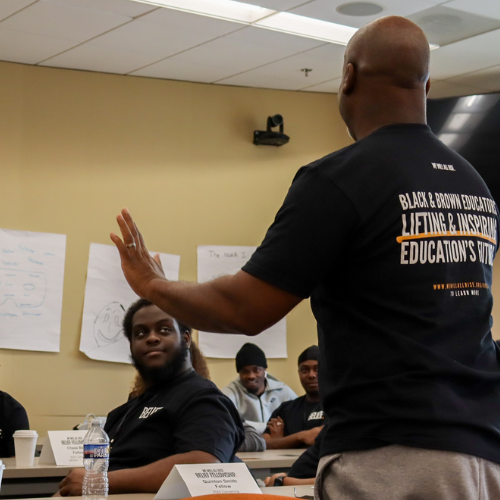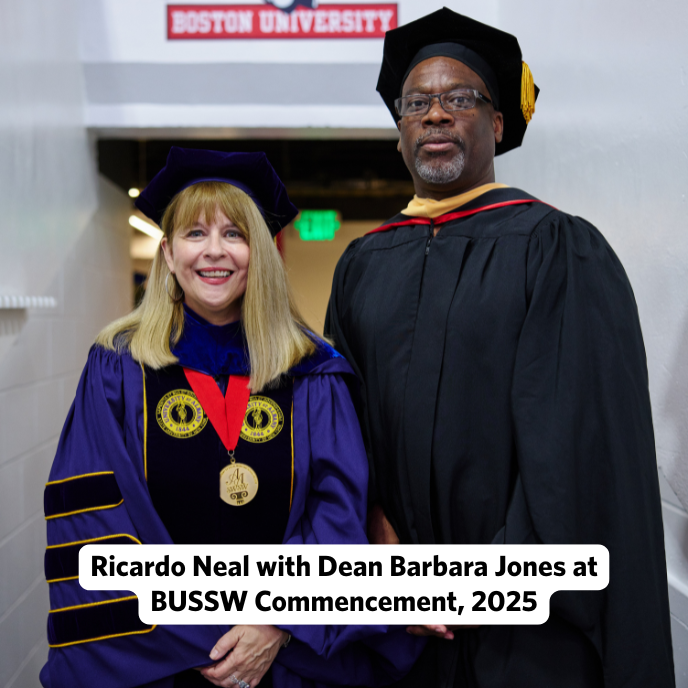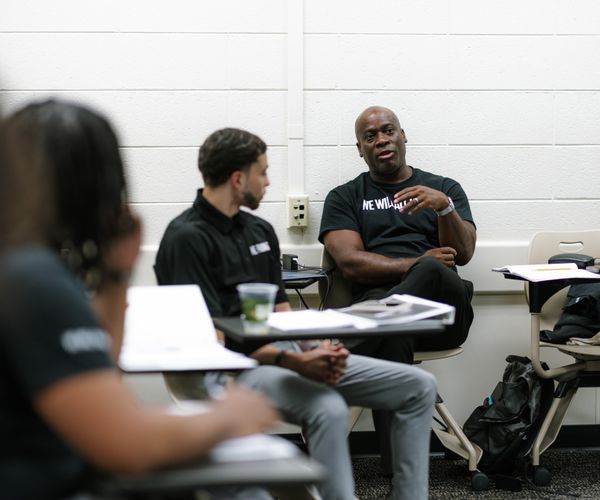Support for real-world lessons from someone who’s learned them
By Louise Kennedy | Published September 2025
Ricardo Neal (SSW’99) grew up in Lawrence, Massachusetts, as one of eight children, then earned a degree in political science at UMass–Amherst. After that, he says, “I thought I would go home, work for a year or two, and then head to law school or business school.”
But the job he got at the Greater Lawrence Family Health Center, as a smoking cessation coordinator, changed his plans.
“I realized that there was so much more to my home city than I knew existed, and so while I was counseling patients around ways to stop smoking, I understood very quickly that there were underlying issues,” Neal says. “I got a sense that the world was bigger than I initially understood around some of the social impediments to success in life.”
That’s when he saw a flyer about BU School of Social Work (BUSSW)—and that’s when he decided to go back to school.
“Going into social work school, I knew I didn’t want to do the clinical stuff,” he says, because his “political science brain” still focused on systems and organizational change. “And I understood there was a path for me. I’m like, ‘Oh, it’s called macro practice, oh, I can still do the work.’ That’s how it all started, and this is where I am some 26 years later.”
 Where he is, after numerous roles in nonprofit leadership and governance, is at the head of We Will All Rise, an organization he founded in 2020 to focus on improving life outcomes for young men of color across the country—in Baltimore, where he now lives, as well as Atlanta, Milwaukee, Boston, and his own hometown, Lawrence, which remains especially close to his heart.
Where he is, after numerous roles in nonprofit leadership and governance, is at the head of We Will All Rise, an organization he founded in 2020 to focus on improving life outcomes for young men of color across the country—in Baltimore, where he now lives, as well as Atlanta, Milwaukee, Boston, and his own hometown, Lawrence, which remains especially close to his heart.
Wherever they are, he says, these young men face similar issues, often deeply challenging ones. But they also share “a fire, a deep desire to do well for themselves, their families, and their communities.”
Neal sees his role as helping them to find opportunities and have the confidence to seize them. “These young men are brilliant, and they need someone to tell them that they’re seen, and that we believe in them,” he says. “I consider my action to be that I’m rewarding their vision, their dreams, their life experiences, until they are able to usher that on their own. Carrying that is almost sacred to me.”
It’s also work that builds on what he learned at BUSSW—not just in the classroom, but in the field. His first placement, he notes, had him working with young people, which he had not done before. That’s now “my sweet spot, where I think I’m most successful,” he says. And his second, with a government agency, taught him that government bureaucracy was not for him. He’s been working in the nonprofit sphere ever since.
“Those field placements, they were essential,” he says. “It teaches you so much by being out there on the ground.” And he’s quick to point out that he couldn’t have done his two placements if they hadn’t paid.
“I needed the money,” Neal says simply, and he knows that today’s students often need it, too. That’s why he created the Williams-Neal Fund for Community Change, named in honor of his family, to provide field education stipends to students who need them.
 “Where I am in life right now, and having gone through the experience,” he says, “I wanted students to have some money to be able to buy groceries, to be able to pay an electric bill or something. It was that important; it was critical to me. The relief I felt in not having to worry about certain things, I wanted students to have.”
“Where I am in life right now, and having gone through the experience,” he says, “I wanted students to have some money to be able to buy groceries, to be able to pay an electric bill or something. It was that important; it was critical to me. The relief I felt in not having to worry about certain things, I wanted students to have.”
Neal also hopes that his gift “can inspire others to do the same, folks who’ve been out there for a while,” he says. “I’m hoping that it could be a catalyst for alumni out there trying to figure out how they could pay it forward.”
If you’d like, make a gift to the Williams-Neal Fund for Community Change.
